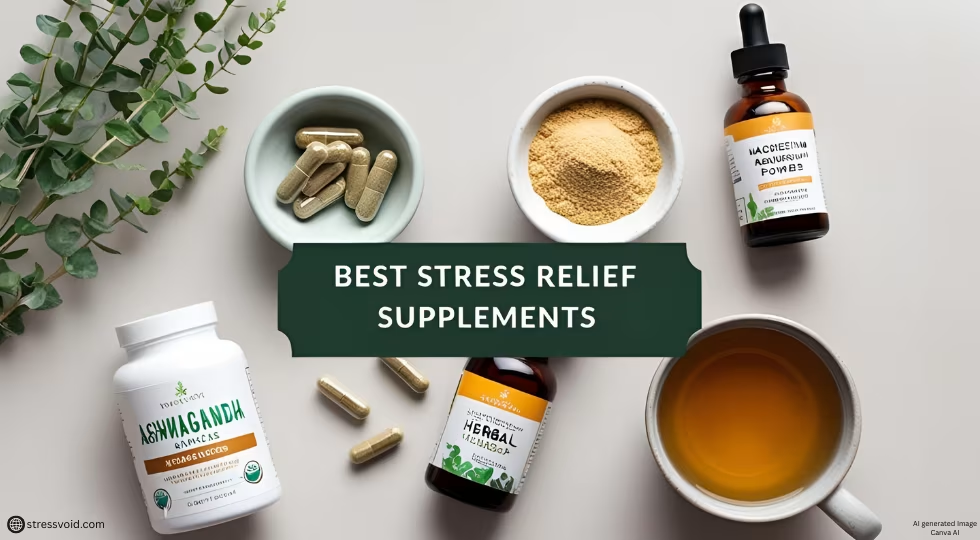Let’s be real—life’s a lot sometimes. Between work, relationships, endless to-do lists, and, well… just existing in the 2020s, stress is basically part of the daily routine. And while things like meditation, exercise, and better sleep habits definitely help, sometimes you need a little extra support to take the edge off.
That’s where stress relief supplements come in.
From calming herbs to mood-balancing minerals, these supplements are designed to help your body handle stress more smoothly—without turning your brain into mush. But with so many options out there, it’s easy to get overwhelmed. Which ones are worth your money? Which actually do something?
Don’t worry—we’ve got you. Today, we’re breaking down the best stress relief supplements on the market right now. Whether you’re dealing with daily tension or full-on burnout, we’ll help you find something that fits your vibe (and actually works).
Table of Contents
What Are Stress Relief Supplements?

So, what exactly are these stress relief supplements?
In a nutshell, these are vitamins, herbs, or natural compounds that help your body manage stress—mentally and physically. Some calm your nerves, some boost your mood, and others help your body bounce back from burnout.
The cool part is these supplements are made with ingredients that have been used for centuries—like ashwagandha, magnesium, or chamomile—and modern research is starting to back them up, too. Whether you’re dealing with anxiety, trouble sleeping, or just too much on your plate, stress relief supplements offer a natural way to take the edge off.
Key Ingredients

When it comes to stress relief supplements, not all ingredients are created equal. Some ingredients are backed by research, while others are a bit more… questionable. To make sure you’re getting the most bang for your buck, here are the top ingredients you should look out for:
Ashwagandha
This adaptogenic herb is a stress-buster powerhouse. It’s known for helping your body adapt to stress, lowering cortisol levels, and improving overall mood. If you’re dealing with chronic stress or burnout, ashwagandha can be a game-changer.Rhodiola Rosea
Another adaptogen, rhodiola is great for reducing fatigue and improving mental clarity during stressful times. It’s perfect for those days when you feel like your brain just can’t keep up with everything going on.L-Theanine
Found in green tea, L-theanine promotes relaxation without making you feel sleepy. It’s a fantastic choice if you need to chill out and focus—whether you’re working on a deadline or just want to de-stress after a long day.Magnesium
This mineral is a total MVP for stress management. Magnesium helps your muscles relax, supports sleep, and can even improve mood. Low magnesium levels are linked to higher anxiety, so if you’re stressed out, you might be running low on this one.Valerian Root
If stress is messing with your sleep, valerian root could help. Known for its calming properties, valerian is often used to improve sleep quality and reduce anxiety, making it ideal if stress is keeping you up at night.GABA (Gamma-Aminobutyric Acid)
GABA is a neurotransmitter that helps calm your brain. It works by inhibiting overactive brain signals, which is why it’s often included in stress relief supplements aimed at reducing anxiety.B Vitamins
Stress can deplete your body’s stores of B vitamins, which are essential for energy production and mental clarity. Supplements that include B-complex vitamins can help restore balance and keep your body functioning at its best.
These are just a few of the key ingredients that make stress relief supplements effective. When choosing a supplement, it’s always a good idea to check the ingredient list and make sure these active ingredients are included—especially if you’re dealing with chronic stress or anxiety.
4 Best Stress Relief Supplements
If you’re looking to grab a stress relief supplement, here are four top-rated options that have gained great reviews for their effectiveness. Each one packs a punch with natural ingredients that can help you manage stress, improve mood, and find a little peace in the chaos.
1. Nature’s Bounty Ashwagandha Capsules
Key Ingredient: Ashwagandha
Why It’s Recommended:
Nature’s Bounty Ashwagandha capsules are a fan favorite for their ability to reduce stress and improve overall mood. This adaptogen has been shown to lower cortisol levels, which can help calm your mind and reduce feelings of anxiety.Pros:
Supports stress reduction
Great for daily use
Affordable
Cons:
May take a few weeks to see full effects
Best For: Chronic stress and general anxiety
Price Range: $15-$20 (90 capsules)
2. Pure Encapsulations Magnesium (Glycinate)
Key Ingredient: Magnesium
Why It’s Recommended:
Magnesium glycinate is a highly bioavailable form of magnesium, making it great for promoting relaxation and reducing anxiety. It also supports sleep quality, so it’s perfect if stress is keeping you up at night.Pros:
Supports relaxation and sleep
Gentle on the stomach
No artificial additives
Cons:
Higher price point
Best For: Stress-induced insomnia and muscle tension
Price Range: $30-$40 (180 capsules)
3. Gaia Herbs Rhodiola Rosea
Key Ingredient: Rhodiola Rosea
Why It’s Recommended:
Gaia Herbs Rhodiola Rosea is great for tackling stress while boosting energy levels and mental clarity. It’s an ideal supplement if you need to keep your focus sharp during high-pressure days.Pros:
Increases energy without jitters
Boosts mood and focus
Organic and sustainably sourced
Cons:
A bit on the pricey side
Best For: Stress and fatigue management
Price Range: $20-$30 (60 capsules)
4. NOW Foods L-Theanine 200mg
Key Ingredient: L-Theanine
Why It’s Recommended:
NOW Foods L-Theanine is perfect if you need to de-stress without feeling sleepy. It promotes relaxation and mental clarity without the sedative effects of other supplements, making it ideal for daytime use.Pros:
Supports calm focus
Non-drowsy
Great value for the price
Cons:
Some users report mild headaches
Best For: Daytime stress relief and focus
Price Range: $15-$20 (60 capsules)
These stress relief supplements are available right now on Amazon and other E-Commerce platforms, which makes it super easy to pick up a bottle and start managing your stress more effectively. Whether you’re looking for a natural anxiety reliever or a sleep aid to combat stress-induced insomnia, these options have you covered!
Choose the Right Stress Relief Supplement
With so many stress relief supplements out there, picking the right one can feel like navigating a maze. But don’t worry! Finding the best option for your needs doesn’t have to be complicated. Here are some key things to consider to help you choose the supplement that works best for you:
1. Identify Your Main Stress Symptoms
Start by thinking about how it’s happening. Is it more mental (anxiety, brain fog), physical (muscle tension, insomnia), or a mix of both? Different supplements target different stress-related issues, so knowing what you need can help you narrow down your options.
-
For Anxiety & Mental Clarity: Look for supplements with ingredients like Ashwagandha, Rhodiola, or L-Theanine.
-
For Better Sleep: Consider options with Magnesium, Valerian Root, or Melatonin (if you’re okay with a sleep-specific aid).
-
For Muscle Tension & Relaxation: Magnesium and L-Theanine can help, but sometimes combining them with other muscle-relaxing herbs like Chamomile can work wonders.
2. Check the Ingredient Quality
Always look for supplements that include high-quality, active ingredients. Avoid products with too many fillers, artificial additives, or unnecessary chemicals. Brands that are transparent about their sourcing and ingredient lists (and preferably third-party tested) are usually the best options. Never buy products that does not disclose their sources, those could be fishy.
3. Consider Your Lifestyle
Think about how often you need your stress relief supplement. Some supplements are great for long-term daily use (like Ashwagandha), while others are better for occasional relief (like Valerian Root for sleep). If you need stress relief throughout the day without feeling drowsy, L-Theanine or Rhodiola are great choices.
4. Start with Low Doses
If you’re new to stress relief supplements, start with a lower dose and see how your body reacts. Even natural ingredients can affect people differently. Starting slow helps avoid any unwanted side effects and lets you gradually find the right balance.
If you take high dose on day first it could be harmful for you.
5. Consult a Healthcare Professional
If you’re taking medications or have any health concerns, it’s always a good idea to chat with your doctor before trying a new supplement. They can help you find the right choice for your health needs and ensure no interactions with other medications.
After seeing these you can choose the best stress relief supplement for yourself but you should always remember that everyone is different, what works for you it may not work for me and vice versa.
Side Effects & Safety Tips
While stress relief supplements can be super helpful, it’s important to remember that, just like anything else you put in your body, they can come with side effects. Luckily, most of these supplements are pretty safe, but it’s always good to know what to expect because you should not negotiate with your health.
Here’s a breakdown of potential side effects and some tips to stay safe:
1. Common Side Effects
Most people tolerate stress relief supplements well, but some mild side effects can occur. These are usually temporary and go away as your body adjusts. Here are some things to watch for:
Drowsiness: Supplements like Valerian Root or Magnesium can make you feel sleepy. If you take them during the day, be prepared for a bit of extra relaxation (which is great for bedtime, but not so much if you’re trying to be productive!).
Upset Stomach: Some people might experience mild digestive issues, especially with magnesium or certain herbs like Ashwagandha. Taking them with food can help minimize this.
Headaches: If you’re sensitive to changes in neurotransmitter levels (like with L-Theanine or GABA), you might get a mild headache, especially if you take too much.
Allergic Reactions: Though rare, some people might be allergic to herbs or plant-based ingredients. If you notice any itching, rashes, or swelling, stop taking the supplement and consult a healthcare provider.
2. Who Should Avoid Certain Ingredients?
Some people should be extra cautious with certain stress relief supplements, especially if they’re pregnant, nursing, or have specific health conditions.
Pregnant or Nursing Women: Certain herbs, like Rhodiola and Valerian Root, might not be safe during pregnancy. Always consult with a healthcare provider if you’re expecting or breastfeeding.
Medications: If you’re on prescription medications (especially for anxiety, depression, or blood pressure), some supplements might interact with your meds. For example, Ashwagandha can have a mild sedative effect, so pairing it with other calming medications might be too much.
People with Certain Health Conditions: If you have kidney or liver issues, or if you’re on blood-thinning medications, talk to your doctor before trying supplements like Magnesium or GABA, as they can interfere with these conditions.
3. How to Take Stress Relief Supplements Safely
To get the most out of your stress relief supplement, and to avoid any negative effects, here are some general safety tips:
Start with a Low Dose: Especially if you’re new to supplements, start slow and increase the dose gradually. This will help your body adjust and prevent any surprises.
Stick to the Recommended Dosage: More isn’t always better. Stick to the recommended dosage on the bottle unless a healthcare professional advises otherwise.
Take with Food (if necessary): Some supplements, like Magnesium, can be tough on your stomach if taken on an empty one. Pairing them with a meal can help prevent digestive issues.
Give It Time: Don’t expect instant results. Most stress relief supplements take time (sometimes weeks) to show their full effects. Be patient and consistent.
4. Consult a Healthcare Provider
If you’re unsure whether a specific stress relief supplement is right for you, it’s always a good idea to talk to a doctor or a licensed healthcare professional. They can help you make informed choices, especially if you have underlying health conditions or are already taking medications.
Frequently Asked Questions
When it comes to stress relief supplements, there are a lot of questions people have. Here are some of the most common ones, answered in a way that should help clear up any confusion!
1. Do Stress Relief Supplements Really Work?
Yes, but it depends on the supplement and the person. Many stress relief supplements, like Ashwagandha, Rhodiola, and L-Theanine, have shown promising results in reducing stress and improving mood in studies. However, results can vary from person to person, so it might take some trial and error to find the one that works best for you.
2. How Long Do Stress Relief Supplements Take to Work?
It usually takes a few days to a few weeks to start feeling the effects of most stress relief supplements. Adaptogens like Ashwagandha often require more time (up to 2-4 weeks) to balance out your body’s stress response. But for something like L-Theanine, you might notice a calming effect within a few hours.
3. Can I Take Stress Relief Supplements Every Day?
Most stress relief supplements are safe for daily use, but it’s important to follow the recommended dosage and take breaks if needed. For example, you can take Ashwagandha daily, but with some supplements like Valerian Root, it might be better to take them only when needed (e.g., before bed). Always check the label and consult a healthcare professional if you’re unsure.
4. Are Stress Relief Supplements Addictive?
No, most stress relief supplements are not addictive, especially natural ones like Magnesium or Ashwagandha. However, it’s important to use them responsibly and not rely on them as your only way to manage stress. Incorporating other stress management techniques (like exercise, mindfulness, or relaxation practices) is key to long-term well-being.
5. Can Stress Relief Supplements Replace Therapy or Medication?
Stress relief supplements can be helpful for managing mild to moderate stress, but they’re not a substitute for professional therapy or medication. If you’re dealing with severe anxiety, depression, or another mental health condition, it’s important to talk to a healthcare provider about your options. Supplements can be a great addition to a holistic approach, but they shouldn’t be your only line of defense.
6. Are Natural Stress Relief Supplements Better Than Prescription Medications?
Natural stress relief supplements are generally considered safer with fewer side effects than prescription medications, but they may not be as powerful. Prescription medications can be necessary for more severe stress or mental health conditions, especially when other treatments don’t work. Always consult your doctor if you’re thinking about switching from prescription meds to supplements.
7. Can I Take Stress Relief Supplements Along with Other Supplements?
It depends on the supplements you’re taking. Some stress relief supplements, like Magnesium and B-Vitamins, can work well alongside others, but always make sure you’re not doubling up on certain ingredients or causing potential interactions. When in doubt, consult your doctor before combining multiple supplements.
8. Do Stress Relief Supplements Have Any Side Effects?
Most stress relief supplements are safe, but they can cause side effects in some people, such as drowsiness, stomach upset, or headaches. Always follow the recommended dose and start slow to see how your body reacts. If you experience any adverse effects, stop taking the supplement and consult a healthcare professional.
This FAQ section can help clarify any lingering questions your readers may have about stress relief supplements. If you have any additional questions, feel free to ask!
Check out these

Stress Relief Gummies vs. Pills in 2025: Which Is Right for You?

Our Say
See supplements are not always bad, they can be. But you can avoid this, whenever you buy stress relief supplements you should always check the ingredients and loot it up on google to make sure of no or less side effects.

